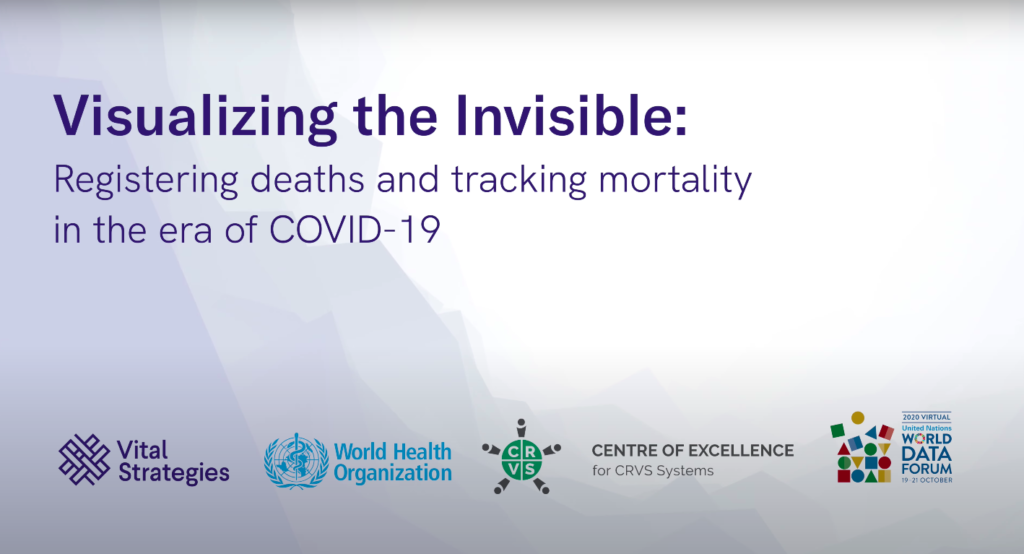Timely and reliable data are essential to informed and effective public health decisions. As COVID-19 continues to spread across the world, it has never been more important to collect accurate and trusted data and produce timely analyses. At Vital Strategies, our team places data at the center of all initiatives; whether a communication campaign or one of our public health programs. We know that data can provide critical information needed to eliminate disparities, design new solutions, and monitor and improve people’s health.
To mark World Statistics Day, we’re highlighting our commitment to data-driven decision-making as we reimagine public health and work toward a world where everyone, everywhere is protected by a strong public health system.
Building Equity in Civil Registration and Vital Statistics
During the COVID-19 crisis, accurate and timely mortality data is invaluable. Yet systemic under-registration of women’s deaths is likely affecting how completely they are counted amid the pandemic. Carla AbouZahr, CRVS Country Advisor at Vital Strategies, and Joan Sara Thomas, Interim Deputy Country Director of Vital Strategies’ Asia-Pacific regional office in Singapore, explain in a new op-ed for Devex: The COVID-19 gender mortality gap — is civil registration the answer?
“In the global struggle against COVID-19, loss of life is the starkest indicator of the pandemic’s human toll. Accurate and timely mortality data — understanding how, where, and when people have died — is invaluable for governments as they coordinate lifesaving public health measures. Most governments already have a system able to capture data on COVID-19’s deadly impact: their civil registration and vital statistics system. Yet systemic underregistration of women’s deaths is likely affecting how completely women are counted under the challenging dynamics of the pandemic.”
Counting the Uncounted at the 2020 World Data Forum

The United Nations World Data Forum each year convenes governments, civil society, the private and nonprofit sectors, media and other professional bodies to discuss and support data innovation. During this year’s virtual event, Vital Strategies, the World Health Organization (WHO), and the Centre of Excellence for Civil Registration and Vital Statistics Systems organized the panel Visualizing the Invisible: Registering deaths and tracking mortality in the era of COVID-19. Dr. Philip Setel, Vice President for Civil Registration and Vital Statistics at Vital Strategies, moderated a discussion on gender inequities in CRVS systems, innovations needed to ensure access to CRVS services, and the need for accurate mortality data in the pandemic response.
Watch the discussion: https://bit.ly/36GMmvz
Note that registration for the World Data Forum is free and can be completed here.
In Short with Data Impact
Not only does data analysis provide critical evidence to governments in guiding their COVID-19 response, but actions taken now to integrate evidence-based decision-making can have important long-term benefits for public health at the national level. Cynthia Driver, Director, and Ruxana Jina, Deputy Director for the Data Impact program of the Bloomberg Philanthropies Data for Health initiative explain how the program collaborates with governments to expand the use of data and enhance public health policymaking.
Global Grants Program Strives to Improve Health Data

Data is critical to governments as they make critical public health decisions. Without access to accurate data, however, governments often rely on “best guess” methods to drive policy and programs. The Global Grants Program seeks to bridge the information gap and improve data processes, helping governments and public health professionals make informed public health investments and decisions.
In a recent Q&A, Director of the Global Grants Program, Lara Tabac, explains the competitive grant application process and the many successes the grants have garnered for country partners—including during the COVID-19 crisis. For example, grant awardees in Ecuador have participated in training on Iris Software to report excess mortality during the pandemic, while partners in Ghana have improved reporting processes by streamlining cause of death data into an e-notification system.
Read more about the Global Grants Program
Tracking Cancer Data to Understand and Act Upon the Health Burden in Myanmar

Population-based cancer registries play a critical role in helping countries to track cancer data and better understand the burden of prevailing cancers within their borders—and form effective responses.
In Myanmar, a central coordination unit has been established for all population-based cancer registries. Having this central base will facilitate standardization across registry reporting and improve the efficiency and transparency of data collection and management. A recent Data to Policy training provided the unit with an important focus on breast cancer, which is the leading cancer for women and source of 13% of all cancer deaths in Myanmar. As part of the training, the group used population-based data to develop a policy brief focused on breast cancer staging and early diagnosis. The brief will be presented to the minister of health and NCD director in a policy forum scheduled for later this year. Through efforts like these, the team in Myanmar continues to develop a better understanding of cancer in the country.
To make responsible and well-informed public health investments, governments and professionals must encourage data innovation. As a global health organization, we are dedicated to supporting data innovation as we work to create a healthier and safer world for all.
About Bloomberg Philanthropies’ Data for Health Initiative
The Data for Health Initiative, supported by Bloomberg Philanthropies and the Government of Australia, is providing technical assistance to more than 20 low- and middle-income countries worldwide to improve public health data systems. The CRVS Program, focusing on improving civil registration and vital statistics, is one of four Initiative components; the other three components focus on data use, developing new tools for noncommunicable disease risk factor surveillance, and strengthening cancer registries.
